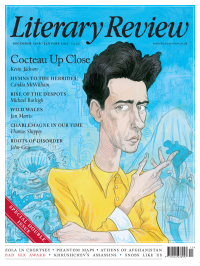Megan Nolan
Yuki Abroad
Harmless Like You
By Rowan Hisayo Buchanan
Sceptre 308pp £14.99
Rowan Hisayo Buchanan, whose mother is Japanese-Chinese-American and whose father is British, described in a recent Guardian interview how her own dual citizenship informed the rootlessness at the heart of her debut novel: ‘On the good days, I feel like I have many homes. On the bad days I feel I have no home.’ Harmless Like You follows the parallel narratives of Yuki Oyama, a Japanese teenager growing up in New York in the late 1960s and early 1970s, and of her abandoned son, Jay, travelling in the present day to find Yuki in Berlin after the death of his father. Yuki’s story is the more substantially and lovingly rendered of the two, although Jay’s portrayal gains some intimacy and depth in the book’s closing quarter.
When Yuki’s parents decide to return to Japan, she asks their permission to remain in New York without them. Yuki is near school-leaving age and plans to go to an American university; her parents reluctantly accept that New York is more of a home for her now than Japan.

Sign Up to our newsletter
Receive free articles, highlights from the archive, news, details of prizes, and much more.@Lit_Review
Follow Literary Review on Twitter
Twitter Feed
How to ruin a film - a short guide by @TWHodgkinson:
Thomas W Hodgkinson - There Was No Sorcerer
Thomas W Hodgkinson: There Was No Sorcerer - Box Office Poison: Hollywood’s Story in a Century of Flops by Tim Robey
literaryreview.co.uk
How to ruin a film - a short guide by @TWHodgkinson:
Thomas W Hodgkinson - There Was No Sorcerer
Thomas W Hodgkinson: There Was No Sorcerer - Box Office Poison: Hollywood’s Story in a Century of Flops by Tim Robey
literaryreview.co.uk
Give the gift that lasts all year with a subscription to Literary Review. Save up to 35% on the cover price when you visit us at https://literaryreview.co.uk/subscribe and enter the code 'XMAS24'